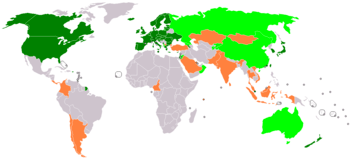Agreement on Government Procurement

The Agreement on Government Procurement (GPA) is a plurilateral agreement under the auspices of the World Trade Organization (WTO) that entered into force in 1981. It was then renegotiated in parallel with the Uruguay Round in 1994, and entered into force on 1 January 1996. The agreement was subsequently revised on 30 March 2012. The revised GPA came into effect on 6 July 2014. It regulates the government procurement of goods and services by the public authorities of the parties to the agreement, based on the principles of openness, transparency and non-discrimination.
Parties
The following WTO Members are parties to the agreement:[1]
| Parties | Accession date |
|---|---|
| Canada | 1 January 1996 |
| The European Union with respect to Austria, Belgium, Denmark, Finland, France, Germany, Greece, Ireland, Italy, Luxemburg, the Netherlands, Portugal, Spain, Sweden and the United Kingdom | 1 January 1996 |
| Israel | 1 January 1996 |
| Japan | 1 January 1996 |
| Norway | 1 January 1996 |
| Switzerland | 1 January 1996 |
| United States | 1 January 1996 |
| The Netherlands with respect to Aruba | 25 October 1996 |
| South Korea | 1 January 1997 |
| Hong Kong SAR | 19 June 1997 |
| Liechtenstein | 18 September 1997 |
| Singapore | 20 October 1997 |
| Iceland | 28 April 2001 |
| The European Union with respect to Cyprus, the Czech Republic, Estonia, Hungary, Latvia, Lithuania, Malta, Poland, the Slovak Republic and Slovenia | 1 May 2004 |
| The European Union with respect to Bulgaria and Romania | 1 January 2007 |
| Taiwan | 15 July 2009 |
| Armenia | 15 September 2011 |
| The European Union with respect to Croatia | 1 July 2013 |
| Montenegro | 15 July 2015 |
| New Zealand | 12 August 2015 |
| Ukraine | 18 May 2016 |
| Moldova | 14 June 2016 |
The following WTO Members have obtained observer status with respect to the GPA, with those marked with an asterisk (*) negotiating accession: Albania*, Argentina, Australia*, Bahrain, Cameroon, Chile, China*, Colombia, Costa Rica, Georgia*, India, Indonesia, Jordan*, Kyrgyz Republic*, Macedonia, Malaysia, Mongolia, Oman*, Pakistan, Panama, Russian Federation, Saudi Arabia, Seychelles, Sri Lanka, Tajikistan*, Thailand, Turkey and Vietnam.[1]
Several commentators have suggested that following the United Kingdom's departure from the European Union, the UK would wish to become a party to the GPA in its own right.[2]
References
- 1 2 "Parties and observers to the GPA". WTO. Retrieved 9 June 2016.
- ↑ e.g. Cameron, A., Brexit: What does it mean for public procurement?, 8 July 2016, accessed 11 September 2016